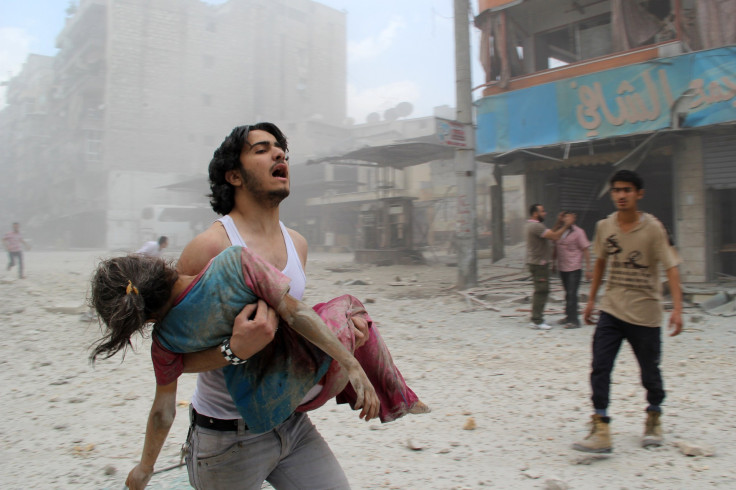ISIS And Al Nusra: Where Will A Syria Ceasefire Take Place?

World powers, including representatives from the U.S., Russia and Iran, put forward a plan last week in Munich to implement a ceasefire in Syria that would allow humanitarian organizations to deliver aid to thousands of civilians in desperate need. The truce proposal, though, is not a complete halt to arms, according to the U.S. State Department. It is instead what senior officials are calling a "cessation of hostilities." The ceasefire would require all parties to stop bombing and attacking each other, but it will leave open the possibility of targeting the Islamic State group and al Nusra Front, the al Qaeda offshoot in the country.
"A ceasefire is more the end of a conflict in most people’s minds and judgment. That’s not where we are," said State Department spokesman John Kirby in a press briefing Friday. "We want to see a pause in the fighting so that this political process can actually get some traction. And then obviously our goal here is a durable and – a durable and whole ceasefire in Syria."
But to enforce a halt in fighting, Kirby said, the ceasefire task force, which is co-chaired by the U.S. and Russia, needs to define what areas are controlled by the Islamic State group, also known as ISIS, and the land controlled by Al Nusra. The U.S. considers both Sunni Muslim extremist groups to be terrorist organizations. It is those territories, the areas controlled by these organizations, that will be left out of any ceasefire agreement. The problem: Al Nusra and ISIS are constantly capturing new land, especially in the northern part of the country amid Russian bombings. The region around Aleppo, the country's largest city, is in flux.
"There’s some mixture there. That’s part of the challenge here, but that’s one of the goals that they’re working towards over the next week or so," Kirby said.
Read the full conclusion and recommendations from "Opposition Forces in Aleppo" here. https://t.co/QCUQZmOn88 pic.twitter.com/IUaSoOjmGc
— ISW (@TheStudyofWar) February 16, 2016
A ceasefire is most likely to take place in the northern corridor from Aleppo city all the way to the Turkish border, where tens of thousands of refugees are living in makeshift camps. A halt in fighting could also likely extend down through Idlib, where the Assad regime and Russia bombed Doctors Without Borders hospitals Monday, killing at least 11 people.
The ceasefire, if implemented correctly, would allow the U.S. coalition and Russia to target ISIS and Al Nusra accurately.
Al Nusra will be more difficult to target than ISIS, according to a new report published by the Institute for the Study of War, a U.S. strategy think tank. Al Nusra has entangled itself inside towns that are also partly occupied by regime forces.
"Jabhat al Nusra’s campaign to transform Syrian society into a population ready to accept a Salafi-jihadi emirate is extremely dangerous to the U.S. in the long term," the report warns. "Convincing the people whom Jabhat al Nusra has helped to survive that they should turn against this group ... will be extremely difficult. It will be impossible as long as those people still face an imminent threat to their survival."
The "cessation of hostilities" plan, proposed in Munich last week, calls for an immediate ceasefire between regime forces and opposition groups. It would take place in stages and would include Russian airdrops of relief supplies to at least 15 towns and cities, humanitarian access by the United Nations, and a stop to Russian and Syrian government airstrikes. It is unclear when the plan would go into effect, but Russian officials had previously put forward a March 1 start date.
Members of the International Syria Support Group, a coalition of 17 countries that came together in 2014 to find a way to stop the yearslong bloodshed in the country, put forward the plan. The discussions did not include the Syrian regime or the Syrian opposition.
The meeting in Munich came just one week after United Nations-brokered peace talks in Geneva fell apart. The talks were supposed to bring together political factions in Syria to discuss a solution to end the five-year conflict but broke down after opposition parties walked out.
Senior officials in the Obama administration are skeptical about whether a ceasefire will actually take place. The U.S. has long questioned Russia's involvement in Syria and has called out the country for bombing civilian targets, including hospitals. Russia has denied the U.S. claims. The dispute shows no sign of healing. It is unclear how the tensions between the U.S. and Russia can permit an agreement on implementing a ceasefire.
"Russia’s bombing of these groups – and frankly, it’s indiscriminate bombing writ large – needs to stop. It needs to end," Kirby said.
© Copyright IBTimes 2024. All rights reserved.




















